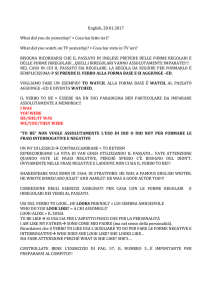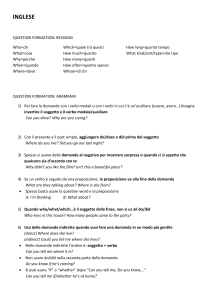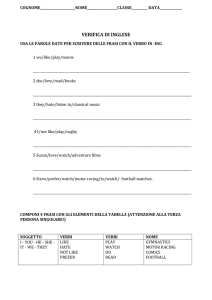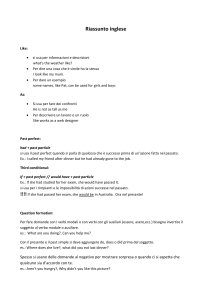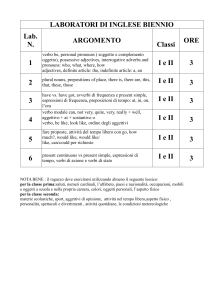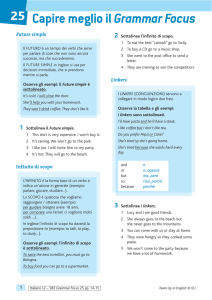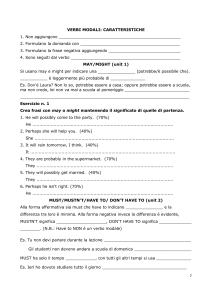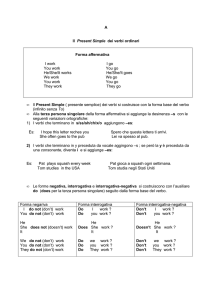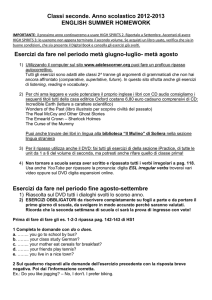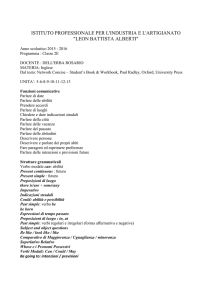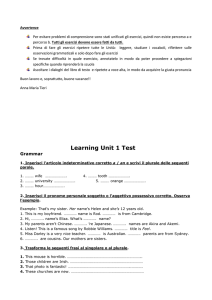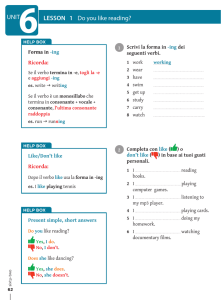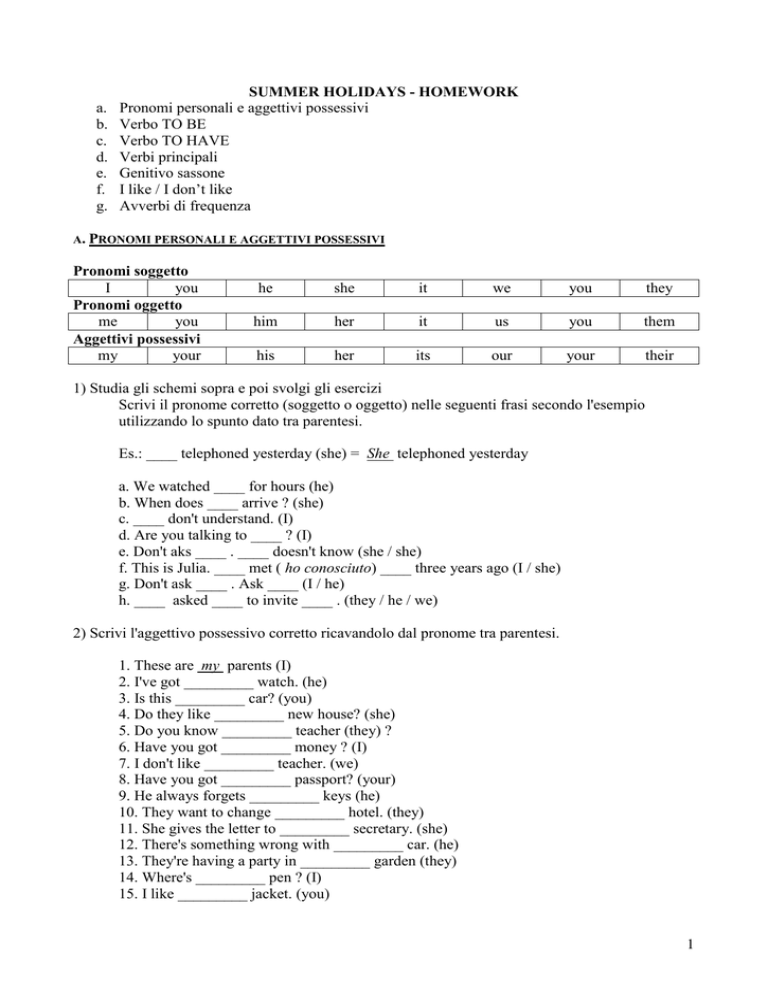
a.
b.
c.
d.
e.
f.
g.
SUMMER HOLIDAYS - HOMEWORK
Pronomi personali e aggettivi possessivi
Verbo TO BE
Verbo TO HAVE
Verbi principali
Genitivo sassone
I like / I don’t like
Avverbi di frequenza
A. PRONOMI PERSONALI E AGGETTIVI POSSESSIVI
Pronomi soggetto
I
you
Pronomi oggetto
me
you
Aggettivi possessivi
my
your
he
she
it
we
you
they
him
her
it
us
you
them
his
her
its
our
your
their
1) Studia gli schemi sopra e poi svolgi gli esercizi
Scrivi il pronome corretto (soggetto o oggetto) nelle seguenti frasi secondo l'esempio
utilizzando lo spunto dato tra parentesi.
Es.: ____ telephoned yesterday (she) = She telephoned yesterday
a. We watched ____ for hours (he)
b. When does ____ arrive ? (she)
c. ____ don't understand. (I)
d. Are you talking to ____ ? (I)
e. Don't aks ____ . ____ doesn't know (she / she)
f. This is Julia. ____ met ( ho conosciuto) ____ three years ago (I / she)
g. Don't ask ____ . Ask ____ (I / he)
h. ____ asked ____ to invite ____ . (they / he / we)
2) Scrivi l'aggettivo possessivo corretto ricavandolo dal pronome tra parentesi.
1. These are my parents (I)
2. I've got _________ watch. (he)
3. Is this _________ car? (you)
4. Do they like _________ new house? (she)
5. Do you know _________ teacher (they) ?
6. Have you got _________ money ? (I)
7. I don't like _________ teacher. (we)
8. Have you got _________ passport? (your)
9. He always forgets _________ keys (he)
10. They want to change _________ hotel. (they)
11. She gives the letter to _________ secretary. (she)
12. There's something wrong with _________ car. (he)
13. They're having a party in _________ garden (they)
14. Where's _________ pen ? (I)
15. I like _________ jacket. (you)
1
3) Completa le seguenti frasi con l'aggettivo possessivo
1. My brother is great. His name is Paul.
2. Are Angela and _________ sister from London ?
3. Hello. Is _________ name David? / Yes, it is.
4. Clare, Jane and _________ dog are in the park.
5. We've got a dog. _________ name is Rover.
6. What are your cousins' names? / _________ names are Mark and Karen.
B. VERBO TO BE
Ripassa il verbo essere nelle sue forme affermativa, interrogativa e negativa e svolgi i
seguenti esercizi
1) Costruisci frasi con il verbo TO BE utilizzando gli spunti secondo l'esempio. Per ogni
frase costruisci anche la forma negativa e interrogativa.
Es.: Tom / be / from the USA = Tom is from the USA
Tom isn't from the USA
Is Tom from the USA?
a. Sue / be / Mexican.
________________________________________________________
________________________________________________________
________________________________________________________
b. His father / be / an electrician
________________________________________________________
________________________________________________________
________________________________________________________
c. You / be / good students
________________________________________________________
________________________________________________________
________________________________________________________
d. His schoolbag / be / red and yellow
________________________________________________________
________________________________________________________
________________________________________________________
e. Their books / be / new
________________________________________________________
________________________________________________________
________________________________________________________
2
2) Scrivi le domande utilizzando le parole date.
Es.: 's name his what? = What's his name ?
a.
b.
c.
d.
e.
she from where 's ?
is American Susan ?
from you where are ?
name her what 's ?
German is she ?
__________________________________
__________________________________
__________________________________
__________________________________
__________________________________
c. Verbo TO HAVE
Dopo aver ripassato il verbo TO HAVE nelle sue forme affermativa, interrogativa e
negativa svolgi i seguenti esercizi.
1) Completa le seguenti frasi con HAVE / HAVEN'T / HAS / HASN'T
a. They ______ got beautiful paintings. (aff.)
b. My brother ______ got any children. (neg.)
c. ______ you got any matches?
d. I ______ got some new boots. (aff.)
e. ______ James got a good job?
f. She ______ got any sisters. (neg.)
g. Katerina ______ got four children.
h. They ______ got a fast car and a lot of money,
but they ______ got any friends (aff. / neg.)
i. We ______ got letters and envelopes, but we ______ got any stamps. (aff. / neg.)
D. VERBI PRINCIPALI
Dopo aver ripassato la coniugazione dei verbi principali (ad es. LIKE, MAKE,
COME ...), svolgi i seguenti esercizi.
1) Terza persona singolare; scrivi la 3a persona seguenti verbi e traducili a fianco.
a) help
b) watch
c) want
d) go
e) carry
f) catch
g) think
h) crash
helps
watches
_________
_________
_________
_________
_________
_________
aiutare
guardare
_________
_________
_________
_________
_________
_________
i) wash _________
j) read _________
k) do
_________
l) fly
_________
m) study _________
n) kiss
_________
o) eat
_________
q) cry
_________
_________
_________
_________
_________
_________
_________
_________
_________
2) Scrivi delle frasi secondo l'esempio utilizzando le informazioni date.
Attenzione alla terza persona singolare !
Es.: I read The Time magazine / (he / Newsweek)
He reads Newsweek
Positive form
1. We live in a house / (she / a flat)
__________________________________________________________________
2. They watch CNN / (Tom / MTV)
__________________________________________________________________
3. You study geography / (Erica / history)
__________________________________________________________________
3
4. I have tea in the morning / (John / coffee)
__________________________________________________________________
Negative form
5. You don't like football / (he / tennis)
__________________________________________________________________
6. We don't speak Polish / (Anna / Italian)
__________________________________________________________________
7. I don't want a drink / (she / a sandwich)
__________________________________________________________________
8. I don't work in the evenings / (she / in the afternoons)
__________________________________________________________________
3) Short answers. Leggi il brano e completa le domande e le risposte sotto al brano.
FOCUS ON HONG KONG
My name's Lee Hung Suk. I'm twenty-one.
I live with my family in a small flat in Hong Kong.
I study psychology. I speak English and Chinese.
I like Chinese and Italian food.
I don't drink coffee or milk but I love Chinese tea.
I don't smoke and I don't have a car.
In the evenings, I watch TV or films on video.
On Saturdays I go to discos, and on Sundays
I play basketball or table tennis.
1. Does Lee live in a flat ? Yes, he does.
2. _________ he work ? no, he doesn't . He studies psychology.
3. _________ he speak Chinese ? Yes, _________.
4. _________ he drink milk ? _________ he _________. He _________ tea.
5. __________________ a car ? _________ he _________ .
6. _________ study on Saturdays ? No, _________ . He _________ to discos.
4) Trasforma le seguenti frasi in affermative, negative o interrogative in base a
quanto indicato tra parentesi
Es.: I visit my parents very often. (neg.) = I don't visit my parents very often
a. He goes to shool every day (neg. / inter.)
______________________________________________________
______________________________________________________
b. She doens't come from France (aff. / interr.)
______________________________________________________
______________________________________________________
c. You watch TV every night. (neg. / inter.)
______________________________________________________
______________________________________________________
d. He washes his car every week (inter. / neg.)
______________________________________________________
______________________________________________________
4
e. Does she work in a restaurant ? (aff. / neg.)
______________________________________________________
______________________________________________________
f. They eat a lot (inter. / neg.)
______________________________________________________
______________________________________________________
g. She doesn't go to school by bus. (aff. / inter.)
______________________________________________________
______________________________________________________
PRESENT CONTINUOUS VS PRESENT SIMPLE
1) Metti il verbo tra parentesi al tempo corretto: semplice o continuo.
Es.:
Don't talk to Louis, he's ________ his homework. (do)
Don't talk to Louis, he's doing his homework.
a. I __________________ the paper every day. (read)
b. Clara's on the phone. She __________________ to her husband. (talk)
c. His daughter __________________ a dress today. (not wear)
d. "What do you do?" / "I _____ a doctor" (be)
e. The children usually __________________ their grandmother on Sundays (visit)
f. "What are you doing?" / "I __________________ for an exam."
2) Rispondi riguardo a te usando Yes, I am / No, I'm not / Yes, I do / No, I don't
a. Are you wearing a T-shirt ? ________________________
b. Are you wearing trousers? ________________________
c. Are you doing this exercise alone? ________________________
d. Do you usually study alone? ________________________
e. Are you sitting at a desk ? ________________________
f. Do you often go to the cinema? ________________________
3) Riordina le parole per formare frasi corrette
Es.: goes jogging Sally never = Sally never goes jogging
a. I Geography studying at moment am the an for exam
_________________________________________________________
b. often goes to she the theatre
_________________________________________________________
c. like we going don't skiing
_________________________________________________________
d. now am having a great I time
_________________________________________________________
e. Mary these days studying a is lot
_________________________________________________________
f. aunt stays us Robert's always with
_________________________________________________________
g. late they sometimes go bed to
_________________________________________________________
5
E. GENITIVO SASSONE
1) Inserisci un " ' " in ogni frase per creare il genitivo sassone.
Es.; My mothers car. = My mother's car
1. Beethovens Fifth Simphony. ___________________________________
2. McDonalds restaurants.
___________________________________
3. Look at the Students Book. ___________________________________
4. Bobs new house.
___________________________________
5. Shakespeares plays.
___________________________________
2) Riscrivi le espressioni con il genitivo sassone.
Es.: The father of Ben. = Ben's father.
1. The sister of Nick
2. The grandmother of Kerrie
3. The brother of Jamie
4. The cousin of Betty
5. The aunt of Caroline
6. The brother of Jack
7. The father of Ann and Tom
8. The parents of my parents
9. The uncle of the children
___________________________________
___________________________________
___________________________________
___________________________________
___________________________________
___________________________________
___________________________________
___________________________________
___________________________________
f. I like / I don't like/ Do you like?
1) Scrivi frasi complete utilizzando le parole date.
es.: Which / sports / you / like / play ? = Which sports do you like playing?
a. I / like / play / basketball and tennis.
_________________________________________________
b. What / he / like / do / in his free time?
_________________________________________________
c. I / like / go out / with my friends.
_________________________________________________
d. You / like / aerobics?
_________________________________________________
e. Nick and Emma / not like / go jogging.
_________________________________________________
2) Giusta o sbagliata ? Scegli la frase corretta come nell'esempio.
Es:
a. __
b. ok
Which sports like you ?
Which sports do you like?
2
a. __
b. __
a. __
b. __
a. __
b. __
I liking playing basketball.
I like playing basketball.
What does she like doing in her free time ?
What do she like doing in her free time ?
Do you like going skiing ?
Do you like go skiing ?
3
4
6
5
6
7
8
a. __
b. __
a. __
b. __
a. __
b. __
a. __
b. __
Does she like going volleyball ?
Does she like playing volleyball ?
I love listen to music.
I love listening to music.
I hate do the housework.
I hate doing the housework.
I like not swimming.
I don't like going swimming.
g. Frequency adverbs
1) Riordina le parole per costruire delle frasi
1. restaurants they have sometimes in lunch
______________________________________________________
2. at swimming weekend we the often go
______________________________________________________
3. sleeps hours Adam a always eight night
______________________________________________________
4. early up wife never Sundays on gets my
______________________________________________________
5. food rarely on put I salt my
______________________________________________________
2) Riscrivi le frasi con gli avverbi di frequenza tra parentesi nella posizione corretta.
Es.: I go to the gym in the afternoon. (often) = I often go to the gym in the afternoon.
1. We're late for school. (never)
__________________________________________
2. They drink tea for breakfast. (always)__________________________________________
3. Samantha goes to discos (sometimes)__________________________________________
4. I'm in bed at 11 o'clock. (usually) __________________________________________
5. We watch TV (rarely)
__________________________________________
7

